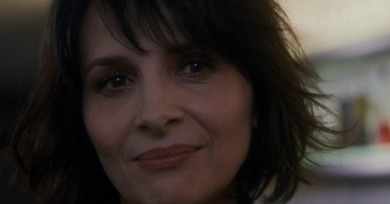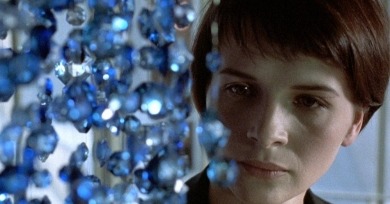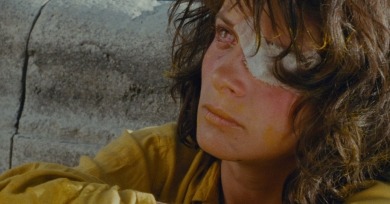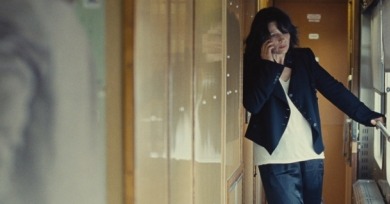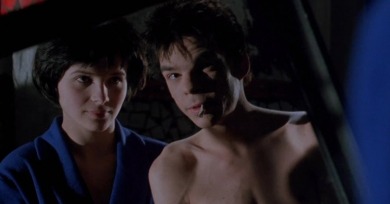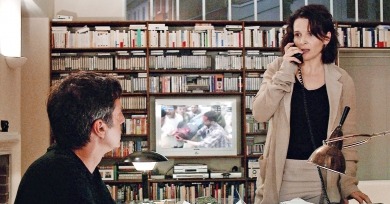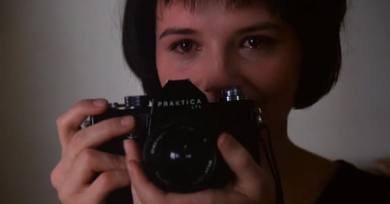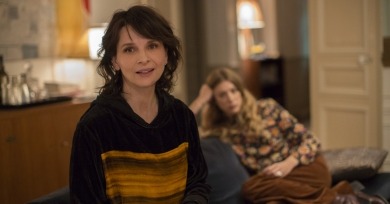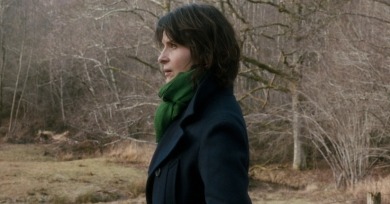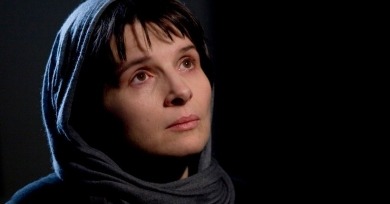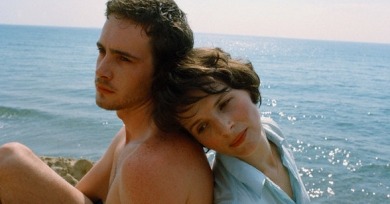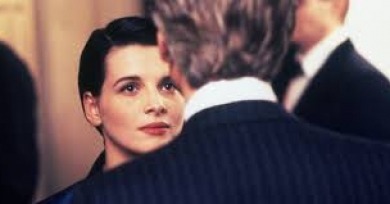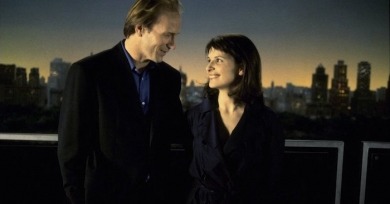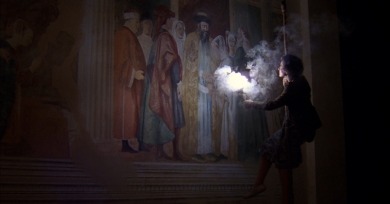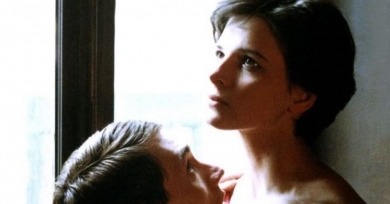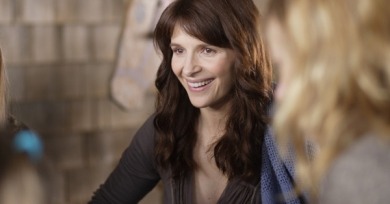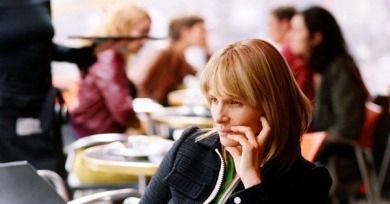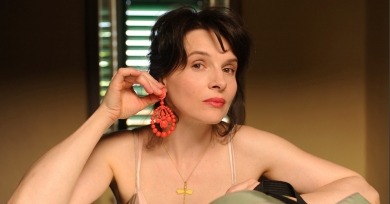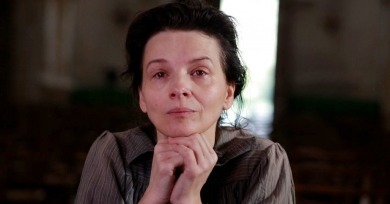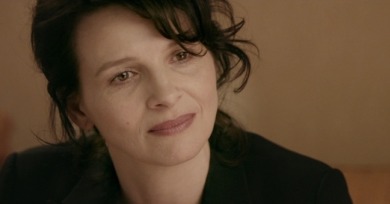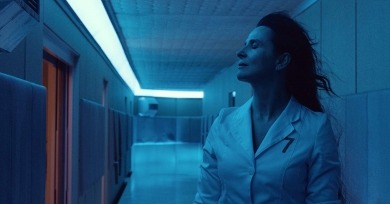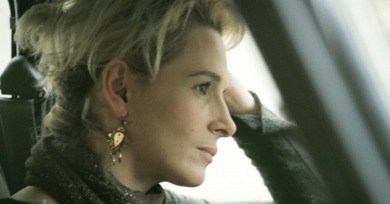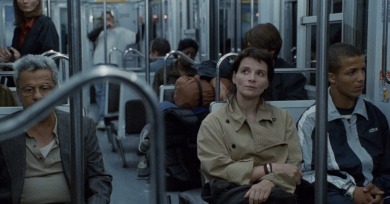Binoche Auteur
She has continually brought to her roles intense dedication, as well as a methodical approach to neuroses that can toggle between effortless and effortful; some can find her showmanship off-putting, while some of us are captivated in a purely pleasurable way.
Kieslowski’s commitment to coloring is consistent, almost totalizing, but there’s always another force in the frame, something colored that isn’t mere color, something seen that’s never fully comprehended: Binoche herself.
She is full-body performer giving a reckless, breakneck, once-in-a-lifetime performance; a movie star dressing up in derelict chic drag; a rich girl in a medical and emotional crisis who has decided to descend to les bas-fonds; and, simply, a victim in pain, near animalistic in her agony, hungrily gnawing the wax caps off plastic jug wine in a passion for oblivion.
We should credit Binoche as the true author of Clouds of Sils Maria because this, in fact, is what the film itself concludes.
It has become cliché to valorize actors for doing much with small gestures, for conjuring an emotion with the tilt of a head, the pursing of lips, the furrowing of a brow. What Binoche is able to do in Mauvais sang is something different: she tells a story.
Would our attention even be drawn, much less held, by Anne were an actor of Binoche’s stature not inhabiting her? Of course not, and Binoche appears to know that. Perhaps this is why, as the film progresses, Binoche seems to actually be leveraging the magnetism of her celebrity to vouch for the character.
Juliette Binoche is one of the icons of the Miramax era, and this facet of her persona is one that radiates, if you will, through her filmography, casting the whole of it in a light that reads to many Anglophone viewers, especially, as symbolic of sensuality and sophistication.
Non-Fiction neither modulates its overall tenor nor its comic beats to suit any single actor.What the part so adroitly handles, though, is Binoche’s persona, recognizing not just her appeal and artistry but also the challenges of navigating the prevailing film culture in the way that she might have before.
She’s as much the vixen as she was in her early roles, but here she lets down her emotional guard. In this, their first collaboration, Denis and Binoche explore the reality of what it means for an older woman, and an older actress, to be so consistently, unapologetically open.
To disregard the specificity of Binoche’s presence is both to downplay the career shifts that a film like Shirin represented for her in the mid-2000s and to ignore how even the most conscientious of Western cinephiles bring culturally specific baggage and blind spots to the global cinema we so eagerly consume
In Téchiné’s film, she rarely indulges in grand gestures—looking at her notes, playing a violin, answering a doorbell. Her face doesn't betray much, but we see the turbulent waves, the currents beneath.
While it is Stephen’s miserable head that the viewer largely inhabits, Anna is the source of the film’s mysteries, and it’s essential that an actor with Binoche’s talent is at hand to rescue the role from its potential as generic raven-haired temptress.
A Couch in New York was Akerman’s ode to classic Hollywood, specifically screwball comedies from the European masters who came to America as émigrés and exiles from their troubled home countries, such as Billy Wilder, Charlie Chaplin, and Ernst Lubitsch.
Because her performance is so often located in reaction shots, and because she can charge even the smallest glance with a history of conflicted feelings, Binoche makes what might have otherwise been a rote audience double into a rich repository for all the film’s inquiries.
She was 20 at the time of shooting, and her callowness is tangible and authentic throughout, but never once does Binoche take a backward step in her performance. Instead she drives the action forward, taking charge of the tempo.
Binoche performs this willful entrapment by playing Marie with a studied self-consciousness. The character is neither dense nor desperate, but she’s eager to please, alert to the things that Dan might find charming.
Summer Hours is a film about the inevitability of movement—of time, of people, of industry—yet also the ways in which human nature strives to avoid long-term variation; how we try to smuggle poignancy into a seemingly inhospitable economic landscape.
Binoche expresses such a range of emotions that we cannot be sure what her endgame is. She won the Best Actress prize at Cannes for her role, an honor that recognizes her ability to captivate an audience even in a performance that keeps shifting and changing registers before our eyes.
Actresses have occasionally been credited with carefully “choosing” roles to curate a specific body of work, but seldom are they acknowledged for creating the circumstances in order to build that body of work the way Binoche has.
Elles arrived at an ideal juncture in Binoche’s career where she began exploring the power and elasticity of a middle-aged body, majestic and eloquent though no longer defined by unbearable lightness.
Denis is hardly ever literal, but she does present a sobering vision of maternity as a prison, as “being caught,” subjugated. In this sense, Dibs wielding her power—what she calls her “total devotion to reproduction”—is also a slavish act of treason. She is a victim, and yet she becomes a tool and perpetrator.
The movie calls on her to disrupt its stillness and austerity, to whirl in with frantic phrases and abrupt movements. She is that frazzle of golden hair, the rush of light bursting in that also brings chaos to order. The balloon floats, but she crashes in.
Even as archetypical “Anne” in Code Unknown, one of her least adorned performances, the tension of those supposed contradictions––generosity and narcissism, tidal emotion and awareness that she’s being watched––is both what animates her scenes and what gives them a critical edge.
